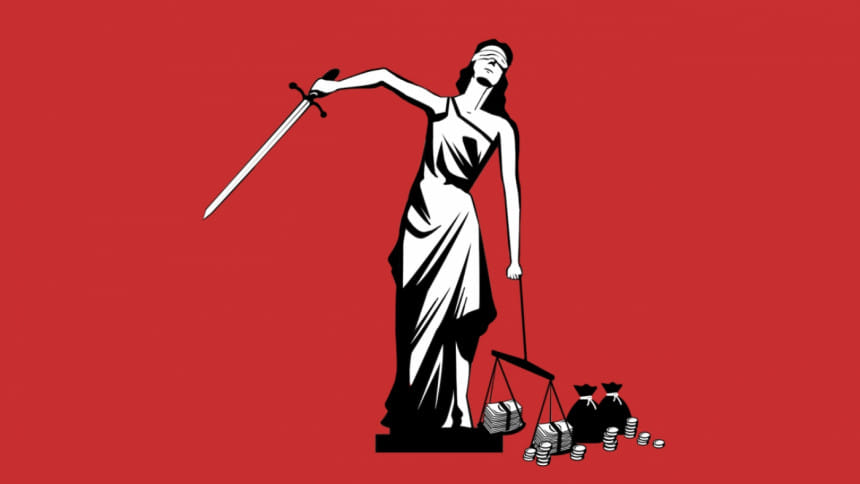What lessons can Bangladesh learn from the Swiss model?

It is a well-known fact that even the least successful example of democracy is better than no democracy. This is because at the core of democratic principles, is accountability of the government to the people. Although no one size fits all, and depending on historical experiences, cultural, social, political and developmental context, there can be many different ways of progression towards democracy, accountability or checks and balances are the key word in the process.
Democracy presupposes that the conduct and performance of public officials, politicians, and other duty bearers or service providers are accountable to the people because they use "public mandate" and public resources to deliver their authority, entrusted or otherwise.
The beauty of the Swiss model of direct democracy can be observed in many different ways. The most relevant dimension in the Bangladesh context is that it shows social accountability in practice, which is a process for constructive engagement between citizens and their government to ensure accountable governance at both national and local levels.
We are getting used to unqualified concentration of power and monopolisation of political space where no realistic scope of a peaceful transition of power appears realistic in the foreseeable future.
The Swiss system of direct democracy also shows how the people of Switzerland are connected to their government, how openly and effectively the government creates the space for public participation and how meaningfully the people participate in the governance process to ensure public ownership of laws, policies and actions. This ownership makes enforcement and compliance a way of life. Power-bearers' accountability to the citizens is the core value and there is in-built process to walk the talk. It often comes with inevitable costs including long delays, which is also acceptable in greater public interest.
There are two main driving forces in democratic governance through social accountability—the people who are the source of all power in the state and the government who possesses the power and responsibility to govern mandated by people.
In terms of approach, social accountability presupposes that firstly, the government keeps the space wide enough for people's voice and demand to be raised, participation and engagement; and secondly, the people are aware of their rights and willing to engage with the duty bearers. Creation of an enabling environment for social accountability demands inter-connected social, economic, and political factors that define the space for constructive engagement.
In addition to checks and balances at the national level, effective connecting of the government including duty bearers with people can promote accountability at the service delivery end, contributing to advancing people's welfare in a just and inclusive manner. The good news is that quite a few such social accountability interventions are taking place at the initiative of NGOs in Bangladesh in some service delivery sectors. TIB has been conducting a robust social accountability campaign at the local level in 45 different places all over the country engaging the common people, particularly the youth in such vital sectors of public interest as education, health, local government, land and climate finance governance.
Visible and measurable success including replication in many cases by the government is taking place. But these are not only limited to the given resources and capacities, but also vulnerable to mostly hesitant political and government responsiveness.
That Bangladesh has a long way to go before a truly enabling environment for social accountability led governance is created and sustained is a common wisdom. We are getting used to unqualified concentration of power and monopolisation of political space where no realistic scope of a peaceful transition of power appears realistic in the foreseeable future. Deepening politicisation and related professional dysfunctionality of key institutions of democratic accountability and national integrity system are undermining the prospect of rule of law.
An ever-shrinking space for civil society and media and a growing intolerance of dissent are denying the prospect of people's participation in governance—through their voice and their demand—in a country that has a strong tradition of civic movements crowned by the glorious Liberation War. Some of the core values and principles of Bangladesh's articulation of independent nationhood are being compromised. Curtailing the scope of constitutionally guaranteed basic rights like freedom of speech, opinion and association by some repressive legal provisions under such controversial laws as ICT Act, Digital Security Act 2018 and the FD Act 2016, followed of late by another draconian draft Voluntary Social Welfare Association (registration and control) Act 2019, is but an example.
Politics as an increasingly dominant factor in corruption and crime and the key driving force behind systematic violation of people's rights and promotion of impunity is increasingly demonising itself in the public eye, especially the young generation. The result is an increasing detachment of politics from the people and public interest. Overall, there is a growing lack of public trust that power belongs to the people. Intimidation and sense of insecurity are so wide and deep that the people hardly believe that they have the right and means to ask for justice and accountability.
It is only natural in this context that as much as we can admire and learn from the Swiss direct democracy model, the prospect of social accountability and democratic governance in Bangladesh will remain tenuous at best in the foreseeable future.
Iftekharuzzaman is Executive Director, Transparency International Bangladesh.
This article is based on the remarks made by the author at the roundtable discussion on "Features of Switzerland's Direct Democracy" held on July 3, 2019, at The Daily Star Centre at the initiative of the Swiss Embassy in Bangladesh and The Daily Star. The views shared here are the author's own, and may not necessarily reflect his official position.
Follow The Daily Star Opinion on Facebook for the latest opinions, commentaries and analyses by experts and professionals.
To contribute your article or letter to The Daily Star Opinion, see our guidelines for submission.

 For all latest news, follow The Daily Star's Google News channel.
For all latest news, follow The Daily Star's Google News channel. 



Comments